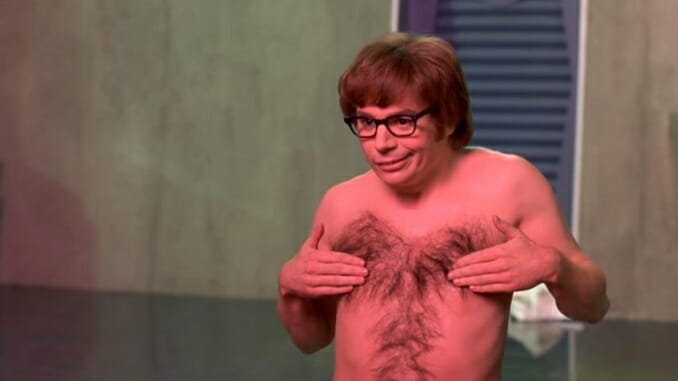Austin Powers: International Man of Mystery Turns 25, But Does It Hold Up?

It’s been 25 years since Austin Powers: International Man of Mystery premiered, and if you’re anything like me, you probably haven’t seen the original Austin Powers in almost as long.
When it comes to Mike Myers, I mostly rewatch Wayne’s World or even the first two Shreks (the Shrek 2 soundtrack is a thing of beauty). That being said, lines from Austin Powers: International Man of Mystery have ingrained themselves into my synapses since my first viewing at the ripe age of seven in 1997. If you were a kid/teenager in the late ’90s, there’s a good chance you spent the better part of your adolescence shouting “Oh, behave!” or if you were a particular brand of rapscallion, “Do I make you horny?”
But the passage of time flattened my memories of the film, regulating it to the bin of misogynistic ’90s comedies I enjoyed since I was essentially raised as a grimy little boy. A lifelong fan of James Bond and 007 (I dressed up as the spy for Halloween the year Austin Powers released), the film was catnip for a young, problematic me.
A Saturday Night Live alum, Mike Myers (not to be confused with Michael Meyers, the crazed killer of the Halloween franchise) tapped a few of his old cast members, like Will Ferrell, to play small parts. The notable parallel here is another SNL alum making movies in the ‘90s, Adam Sandler, who would play loveable misogynists not from the swinging sixties. (A noteworthy exception is The Wedding Singer; not only was it set in the ’80s, but Sandler’s character Robbie Hart was a gem of a man.)
Although Sandler’s movies often started with the loveable-loser-who’s-a-mild-misogynist trope and revolved around his redemption, Myers decided to imagine if James Bond were a disgusting-yet-somehow-still-a-sex-symbol secret agent from the sixties transported to the 1990s via cryogenic freeze. Moving his secret agent from the ’50s to the ’60s was a deft move on Myers’ part, enabling him to imbue Austin Powers with idealistic sentiments of free love rather than James Bonds’ cold superiority to the women he sleeps with and, ultimately, abandons. Of course, Powers is a cultural cousin, if not brother, of Evelyn Tremble (played by Peter Sellers) in the 1967 James Bond parody Casino Royale).
A speech Myers delivers toward the end of the film touches on why it’s hard to view Powers’ womanizing as anything other than cheeky fun. When Dr. Evil (also played by Myers) tells Powers his ideology failed, the titular spy responds:
-

-

-

-

- Curated Home Page Articles By Test Admin October 21, 2025 | 3:10pm
-

- Curated Home Page Articles By Test Admin October 21, 2025 | 2:57pm
- Urls By Test Admin October 21, 2025 | 2:57pm
- Curated Home Page Articles By Test Admin October 21, 2025 | 2:55pm
-

-

-

-

-

-

-

-

-

-

-

-

-

-

-

-

-

-

-

-

-

-

-

-

-

-

-

-

-

-

-




































